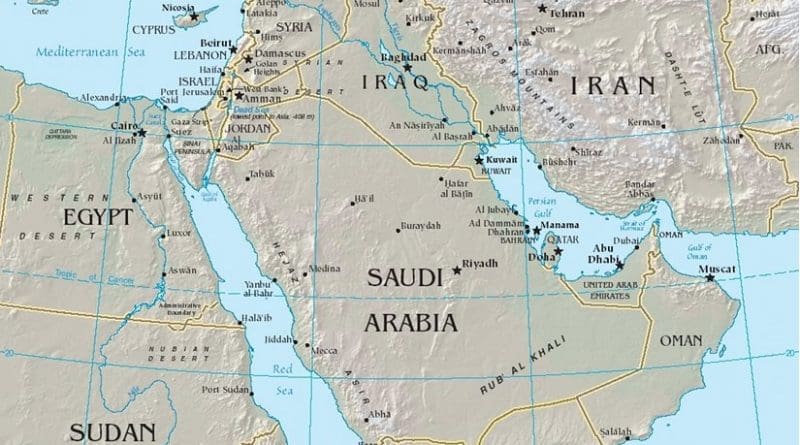Turkey-Iran Relations And The Syrian Quagmire – OpEd
For a long time, various Iranian politicians including President Hassan Rouhani have expressed the hope that the relations between Iran and Turkey can remain insulated from the surrounding crises, especially in Syria. As there are reports of President Rouhani’s planned trip to Turkey in the near future, and given the vast economic opportunities to expand the Iran-Turkish trade in the post nuclear agreement era, it is fairly safe to assume that Iran will continue to cling to this hopeful expectation — that is becoming more and more difficult to sustain in light of the big divide between Ankara and Tehran over Syria.
In the aftermath of the latest Ankara bombing, which the government quickly pinned on the Syrian Kurds, Turkey’s army has begun to cross the border into Syria while intensifying the shelling of Kurdish strongholds held by the People’s Protection Units (YPG), which has denied responsibility for the Ankara bombing, to no avail as Turkey has seized on the opportunity to justify its military incursion inside Syria, backed by Saudi Arabia, precisely at a time when the Syria International Contact Group has brokered a partial cease-fire that needs to take into effect immediately given the US-Russia cooperation that is key to resolving the Syrian crisis. Since the start of this crisis, Ankara has backed the rebel groups, provided safe routes for fighters and weapons into Syria, and has been blamed in the international community for helping the creation of Islamic State (Daesh), which is the target of allied (US) bombing using Turkish bases. Under growing international pressure, Ankara has in recent months tightened the border controls, built a wall, and apprehended hundreds of terrorists.
Supporting opposing sides in the Syrian theater since 2011, Turkey and Iran must somehow manage their rifts over Syria or it is bound to exact a price on their bilateral relations; already, the absence of a substantial increase in their trade relations in the post-JCPOA context is indicative of the hidden jitters that chew at the fabric of Iran-Turkey relations. Tehran considers YPG an important ally of Damascus, which is rapidly gaining the upper hands over the Saudi and Turkish-backed rebels thanks to the Russian air campaign, and it is questionable if Turkey can do anything to prevent a strong Kurdish-dominated administration in north-east Syria short of a full-scale invasion that, in turn, risks confrontation with Syria and its Russian-Iranian-Hizbollah allies? Turkey’s relations with Russia is already at an all-time low following the recent downing of a Russian jet by Turkish air force and, clearly, Russia will not tolerate a no-fly zone that would free Turkish army’s hands against the Syrian Kurds. French President Francois Hollande has correctly warned that Ankara’s escalating involvement in the conflict was creating a risk of war between Turkey and Russia. Without air cover, Turkey’s military meddling in Syria will inevitably fall short of a ‘game-changer’ and, as we all know, neither the US nor NATO is willing to risk a face-off with Russia over Syria.
Of course, Turkey has the option of giving up on its “regime-change” approach toward Damascus that has so far yielded no tangible benefits to Ankara, save some 2.5 million refugees and the endemic acts of terrorism in the once cheery peaceful Turkey. A resurrected central authority in Damascus would be in a better position to stabilize the borders and assure Turkey regarding its Kurdish fears. Instead, Turkey continues today to play into the hands of Saudi Arabia, which has its own priorities not necessarily in sync with Turkey, all the more reason for the Turkish leaders not to fall in the Saudi trap and thus inflict serious long-term damage to their relations with their own immediate neighbors.
The Syrian government can of course take important steps, by agreeing to meaningful dialogue with the Syrian opposition and agreeing to form a government of national unity, and Iran can and should persuade Damascus to pursue this path, which is a sine qua non for the return of stability in Syria. All efforts would then focus on dislodging the ISIS terrorists, who are benefited by the Turkish assaults on their Kurdish enemies. Indeed, the net beneficiary of Turkey’s current policy path on Syria is the ISIS terrorists, and the sooner the Turks come to this realization, the better.
This article appeared at Iran Review.


Failure of Ongoing attempts of dialog between Syrian Government and so called opposition voices indicates that the Syrian Government believes that the Opposition does not represents the Syrian people at all and is pursuing the agenda of others. Furthermore, President Assad of Syria is also not feeling any pressure of domestic opposition from Syrian people as he knew the very fact that he is now considered as the Saver of Nation among masses.
Therefore, attempts to pressurize Assad by portraying outsiders as Syrian opposition deemed to fail as usual.